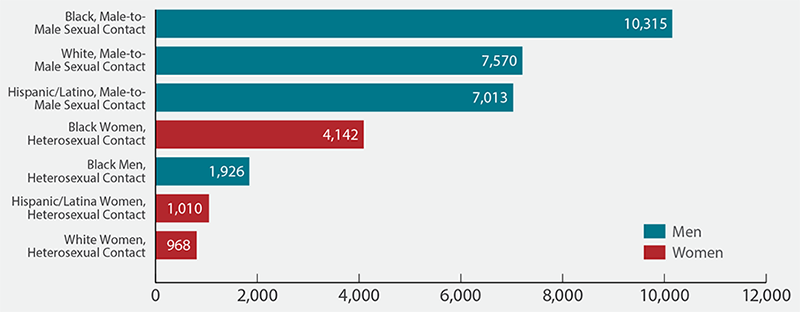Dec 1 is a day set aside globally to recognise an ongoing fight in public health. This fight, unfortunately, is often overlooked in the US, despite a large number of sufferers - after all, there's a solution and it's well-managed, right?
Not quite.
True, antiretroviral therapy (ART) is available to combat HIV/AIDS, but it's no silver bullet. No these drugs, at best, keep the virus in stasis (provided the drugs are taken like clockwork) and bring a host of negative side effects to the patients.
Did I mention that these drugs meed to be taken for the rest of one's life and that they aren't always cheap? Right, fancy that.
- In the US
- > 1.2 million individuals are living with HIV
- ~39 500 individuals were newly-diagnosed in 2015
- 67% were gay & bisexual men
- 82% of all male diagnoses
- 24% attributed to heterosexual contact
- 6% attributed to injection drug use
- African-Americans are 13% of the population, but represented ~ 45% of new diagnoses
 |
| New HIV Diagnoses in the United States for the Most-Affected Subpopulations, 2015 |
- ~ 13 000 passed away from AIDS-related complications
- Approximately 37% are on ARTs
- In Sub-Saharan Africa
- Approximately 24.7 million people are living with HIV
- In 2014, there were 1.5 million new infections
- Roughly 1.1 million individuals died from HIV/AIDS complications in 2014
- Only 39% of individuals are on ARTs
- South Africa, where I grew up, has a 19.2% prevalence of HIV in the adult population
- Only 48% of those are currently receiving ARTs
- South Africa has the biggest HIV epidemic of any country in the world
- In Asia and the Pacific
- Roughly 5.1 million are living with HIV
- 300 000 were newly diagnosed in 2014
- 180 000 passed away in 2014
- 41% are on ARTs
- In the Middle East and North Africa
- 230 000 people are living with HIV
- There were 21 000 new infections in 2014
- There were 12 000 new deaths in 2014
- Only 17% are on ARTs
- In Latin America
- 1.6 million are living with HIV
- 94 000 are newly-infected as of 2014
- 47 000 have passed away in 2014
- 44% are on ARTs
- In the Caribbean
- 250 000 are living with HIV
- 12 000 were newly-infected as of 2014
- 11 000 had passed away
- 42% are on ARTs
- In Eastern Europe and Central Asia
- 1.5 million were living with HIV in 2014
- There were 190 000 new infections
- 47 000 passed away from HIV/AIDS complications
- 21% were on ARTs
- In Western and Central Europe
- Approximately 1.2 million are living with HIV
- Approximately 50 000 were new infections
- Approximately 9000 passed away
- 59% are on ARTs
So, now that you're just a slight bit more aware of the global AIDS crisis, please, get involved. There are a myriad of organisations committed to HIV/AIDS research and awareness, including the NIH, amfAR, UNAIDS, (Red) campaign, One, and more.
Maybe supporting an AIDS orphanage is more up your alley. If so, Beautiful Gate is one I know of personally, but there are many similar organisations around the world.
The point is, please, speak up, get tested, fight the stigma, and, most importantly, campaign for a cure.
Maybe supporting an AIDS orphanage is more up your alley. If so, Beautiful Gate is one I know of personally, but there are many similar organisations around the world.
The point is, please, speak up, get tested, fight the stigma, and, most importantly, campaign for a cure.
Sources
- https://www.aids.gov/hiv-aids-basics/hiv-aids-101/statistics/
- http://www.avert.org/global-hiv-and-aids-statistics



